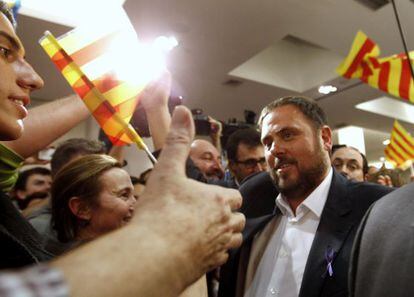Pro-Spain Ciutadans group demands Mas step down as regional premier
ERC offers to support next year’s referendum but uncertain about coalition

The pro-Spain Ciutadans political group was a big winner in Sunday’s regional elections in Catalonia, tripling its number of deputies in the local legislature.
“Today more than ever I can say that Catalonia is my homeland, Spain is my country, and Europe is my future,” Albert Rivera told supporters Sunday night following the vote count that gave Ciutadans six more seats above the three the grouping had in the regional parliament.
It was the best showing yet for Rivera’s organization, which fought bitterly against Artur Mas and his nationalist CiU bloc’s secessionist stance. Rivera and his organization had sponsored a huge pro-Spain rally in Barcelona that was held on the heels of the massive demonstration in favor of independence organized by CiU on September 11 — Catalonia Day.
Besides offering a non-secessionist platform, Rivera also campaigned against budget cuts
Besides offering a non-secessionist platform, Rivera also campaigned against budget cuts by the national Popular Party (PP) government in health and education. His organization was buoyed by voters’ loss of faith in the Catalan Socialist Party (PSC), which lost eight seats and saw its membership in the parliament drop to 20.
The Catalan Republican Left (ERC) was another big winner on Sunday, becoming the second-largest political force in the northwest region. The ERC doubled its members in the regional legislature to 21 seats. With its strong showing, the ERC made a friendly gesture to Mas on Monday, asking his CiU bloc to continue rallying support for a referendum next year.
“If the CiU wants an agreement, it has to give us some type of signal; the organization cannot continue giving all its power to the PP,” said ERC leader Oriol Junqueras in reference to Mas’ parliamentary agreement with the conservatives in the last legislature. Junqueras added that his group “wasn’t too inspired” at this point to enter into a coalition partnership with the Mas government and suggested the ERC might remain as an opposition party.
If the CiU wants an agreement, it has to give us some type of signal"
The PP’s leader in Catalonia, Alicia Sánchez-Camacho, said a CiU-ERC government would be “disastrous” for Catalonia, giving her view that voters had told Mas that “they don’t want a pro-independence legislature.”
Rivera was more direct; he demanded that Mas resign. “If Mas had any dignity, he would step down,” the Ciutadans leader said. “CiU may have won the elections, but Mas’ strategy didn’t work.”
Mas had tried to use the early election as a vote on the issue of a referendum. Despite the CiU’s poor showing, the regional premier has said he will move ahead with his plans to hold a vote next year on the region’s status quo. Junqueras also said he supports the referendum. “The process leading to the upcoming sovereignty vote has been endorsed,” he said.
The pro-independence movement is more distributed among different parties now"
But some voters believe that calling a referendum will be a difficult task because of the different parties who may want to take credit for it. “Mas was hurt... The pro-independence movement is more distributed among different parties now, but the issue is important enough so that I think they will do everything to stay united,” said Oriol Vilaseca, 38, who works for a family business and voted for CiU, in an interview with Reuters.
But Alfred Bosch, an ERC deputy, believes the “will of the people” will trump any constitutional impediment to a plebiscite, which the PP has suggested it may introduce.










































